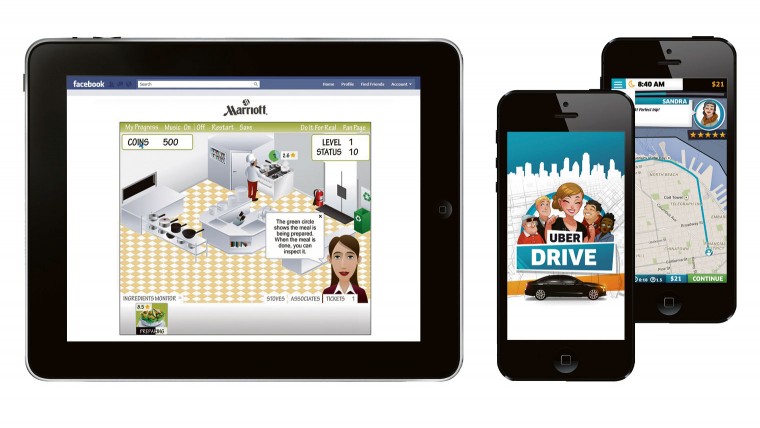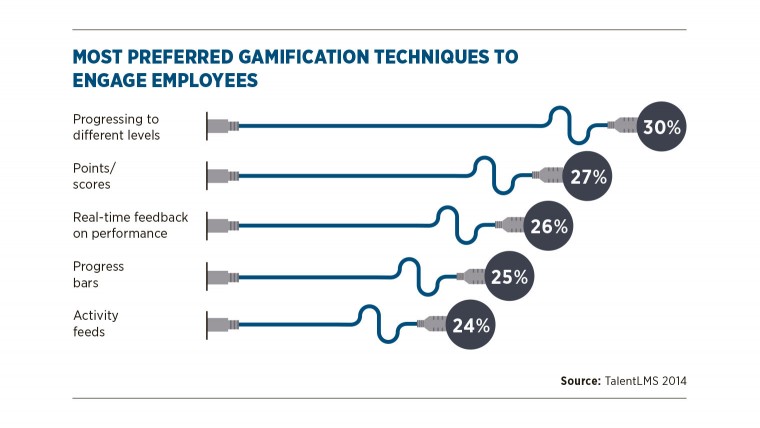One of the most enduring challenges facing employers and employees alike is engagement. The difficulty of getting and keeping staff members aligned, focused and extraordinary has only been exacerbated by the growth of mobile and social technology. For example, British workers admit to spending an hour a day goofing off online between nine and five; as a self-reported statistic, the real number is likely to be even higher.
To drive engagement and compete with the endless distractions in the workplace, forward-thinking companies are embracing a novel approach called gamification. This is the use of game concepts for non-entertainment purposes. In this case, it’s used to recruit, train, retain and engage staff across a wide range of industries and functions. In subtle and not-so-subtle ways, gamification is transforming the way we work.
Innovative companies are turning to the power of games to help find the right people and ensure they will be great long term
Recruitment is a costly endeavour for most businesses, whether they must comb through thousands of CVs for lightly skilled work or dig deeply to find just the right in-demand software programmer in a super competitive landscape. Costs to recruit a highly skilled employee can routinely approach £100,000 and losing that person because they’re ultimately a bad fit can easily double that.

Engaging prospective employees
So innovative companies are turning to the power of games to help find the right people and ensure they will be great long term. Among these is Marriott International, which built a game called My Marriott Hotel that enables prospective housekeeping and front-line staff to try out what it is like to clean at one of the company’s global properties. Global transport app Uber built a game called UberDrive that lets you see if you have the right stuff to drive for Uber and learn how along the way. And pizza chain Domino’s app Domino’s Pizza Hero lets you make and bake your own pizza in the virtual world, and have it delivered to your door in real life.

My Marriott Hotel Facebook game enables prospective staff to feel what it’s like to work at a hotel. UberDrive mobile game to engage current and prospective “driver-partners”
While the games are fun in their own right, if you do well in the virtual world, they will invite you to apply for a real job. The theory is that your performance in the game is predictive of your success at work and these games are a great recruiting tool for the millennial generation.
And what about those higher-skilled information workers? Leave it to the Danish LEGO company to run arguably one of the world’s most fun gamified recruitment programmes. Each year prospective designers are invited to submit videos of themselves making new LEGO creations and the best are invited to a special design game day at headquarters. There, designers are challenged to complete puzzles, build under pressure and work together in spontaneous teams in ways that are not dissimilar to recruitment game shows such as Gordon Ramsay’s Hell’s Kitchen, but with less swearing and yelling. The best are invited to join the highly secretive and incredibly sought-after LEGO design team in Billund – the dream job for any grown-up kid.
Once you’ve won the game to get in the door, the workplace of the future also has some great gamified surprises in store to help you learn and train on the job. While most corporate training programmes tend to be boring and underutilised, they are nonetheless crucial to both employers and employees looking to increase skills development.
Getting the most out of your workforce
But how to get people to learn more? Delta Airlines have decided to change the paradigm by converting large swaths of their training programmes to be game-based. Their app, Ready Set Jet, allows their 80,000 global employees to learn about their jobs, systems and the Delta way through a series of mini games. The application has been so successful that employees have completed four times the amount of training normally required of their own volition and on their own time.
If you work for a financial services firm in the UK, you will probably have played a compliance game in the last few years designed by startup True Office. The anti-bribery and anti-corruption game puts players in various situations, and asks them to take actions that help explain legal risks and compliance in a constructive way.

Also recognising the opportunity to generate better results through gamification, McDonald’s launched a Till Training Game to teach thousands of UK employees how to use their new point-of-sale system, at the same time generating a real buzz and excitement. In every case, the gamified learning system improves dramatically on the old way of reading a manual while also driving better results through greater learning.
Engaging employees in their core job and retaining the best staff are among the most complicated things in today’s economy. So just as with other aspects of work, gamification is promising to change the landscape for how we interact on the job. The Department for Work and Pensions understood this some years ago while trying to unlock greater innovation in this large government sector. Called Idea Street, the project aimed to get staff to share ideas for innovation, cost-savings and efficiency by ensuring a diverse range of voices were heard.
In an environment not always known for openness and forward thinking, Idea Street created a virtual stock market for innovation where any staffer could propose an idea to management. These ideas then became equities that other employees could buy and sell using virtual currency, the highest price stocks effectively being the most popular ideas. In the first 18 months, more than £90 million was saved using the programme and it received broadly positive reviews from employees who felt like they were truly heard.
Rewarding your staff
Another workplace function receiving a makeover from gamification is travel expenses. Companies such as Google and startups including Rocketrip are using gamification to encourage employees to spend less on the road while still hitting corporate objectives. They do this by treating any money saved over baseline as points that staff can redeem for cash, charity or to use for a future trip. In a nutshell, if you save money, you can reap some of the benefit instead of turning them over wholesale to the company. As with much of gamification, success is predicated on creating a win-win for employees and employers.
Gamification has shown tremendous promise and continues to grow as a top strategy for human resources leadership in the UK and around the world, but some critics argue that it over emphasises rewarding people for things they should be doing anyway. Why should you incentivise staff to do their jobs when their salary and personal satisfaction should be sufficient?
Of course, gamification isn’t a panacea for workers who genuinely don’t want to contribute or companies with terrible work environments. These must be structurally addressed for gamification to work. However, with ever-increasing competition for the best employees and endless distractions from smartphones and social media, savvy employers are using the power of games to make the workplace more fun and engaging. This emphasis on better recruitment, training and engagement is truly transforming the jobs of the future – and fun’s the name of the game.
